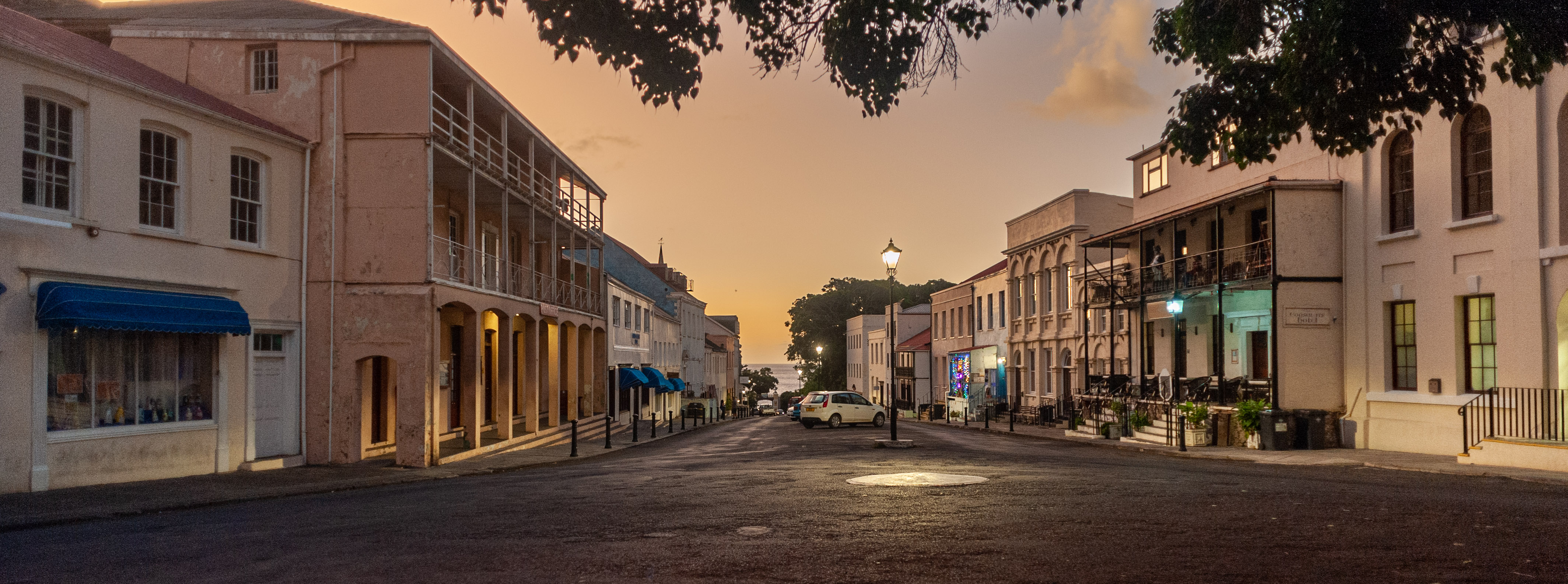
Out of Place and Time
Crossing from Walvis Bay
It is my watch. Merel has found the source of the annoying noise we both heard last night — the lower stays are loose! The lowers stop the mast moving from side to side and they are completely slack! Apparently the locknuts were not done up when the lowers were replaced in Cape Town and with normal vibration the screws have undone themselves. I take the slack out of them and do up the locknuts. Tomorrow I will take the sails down and see if I can do a better job. In the dark I cannot see if the mast is straight.
Next day, I find a bolt on the foredeck, just sitting there. It comes from the new furler torsion plates installed by the riggers in Cape Town and when I check there is just one bolt that is kind of tight, two bolts loose but still in place, and two bolts missing. I fix it, replace the missing bolts, and apply Loctite to make sure they don't work themselves loose again.
Next, I find a split-pin on the foredeck — that comes from the inner furler which is lucky to still be in place as there is nothing holding the lower gudgeon.
Now I am wary of anything touched by the riggers in Cape Town. They did a great job but clearly omitted to tighten anything!
The wind comes and goes, gradually getting lighter. I am happy to run the engine as we are still in need of water and always in need of electricity. It is quite overcast and solar is not enough. This is man's current existential dilemma: electricity is so seductively controllable, so easy to finesse, so apparently 'clean' and 'green'; but so hard to produce. As better ways are found to produce more of the stuff our appetites for it increase just a bit more than the available supply.
On the second day the water temperature rises to 'swimmable' and we take full advantage by dropping the sails and jumping off the back of the boat.
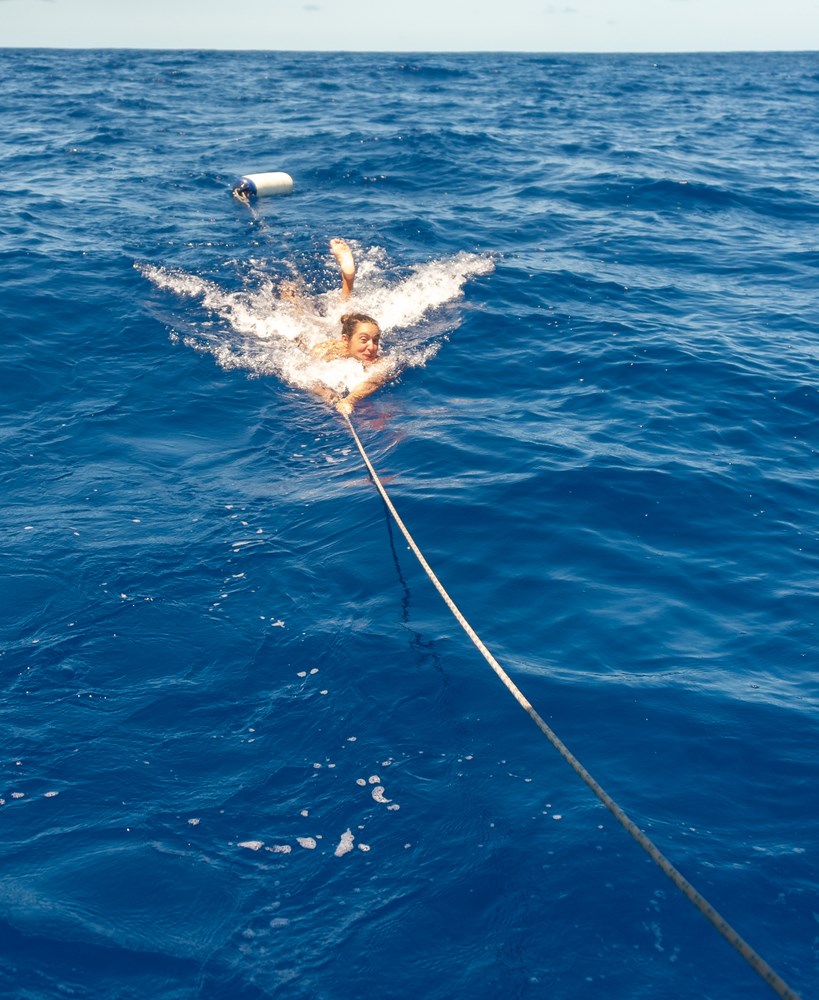
↑ The water here is 3.5 km deep
In the late morning of 29 March, after a 9-day sail from Walvis Bay, Namibia, we get our first sight of St Helena:
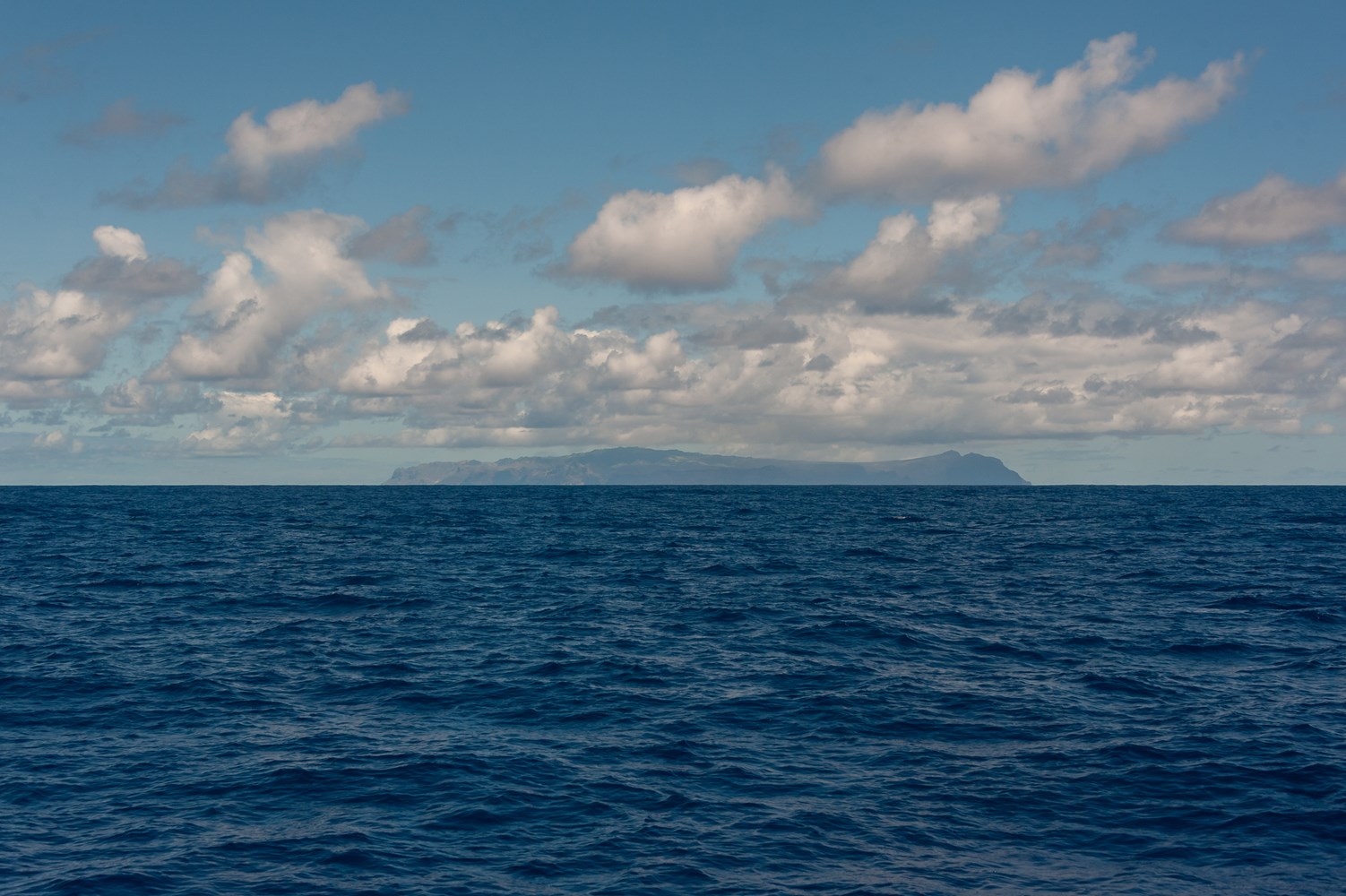
↑ It is no longer any great accomplishment to find this small island in the middle of the South Atlantic, but it would have been quite something a hundred years ago.
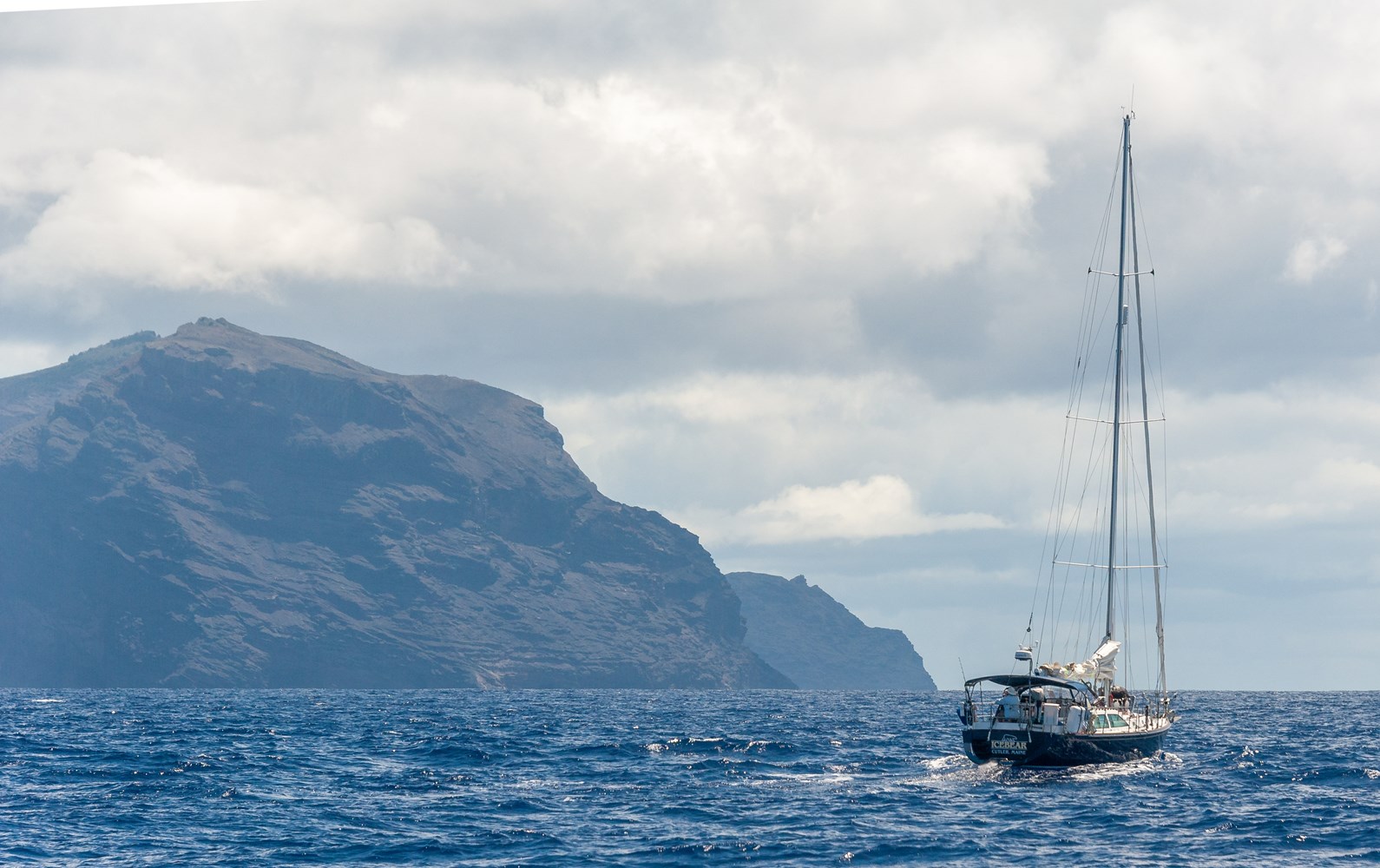
↑ Ice Bear: we meet up with friends as we close on St Helena.
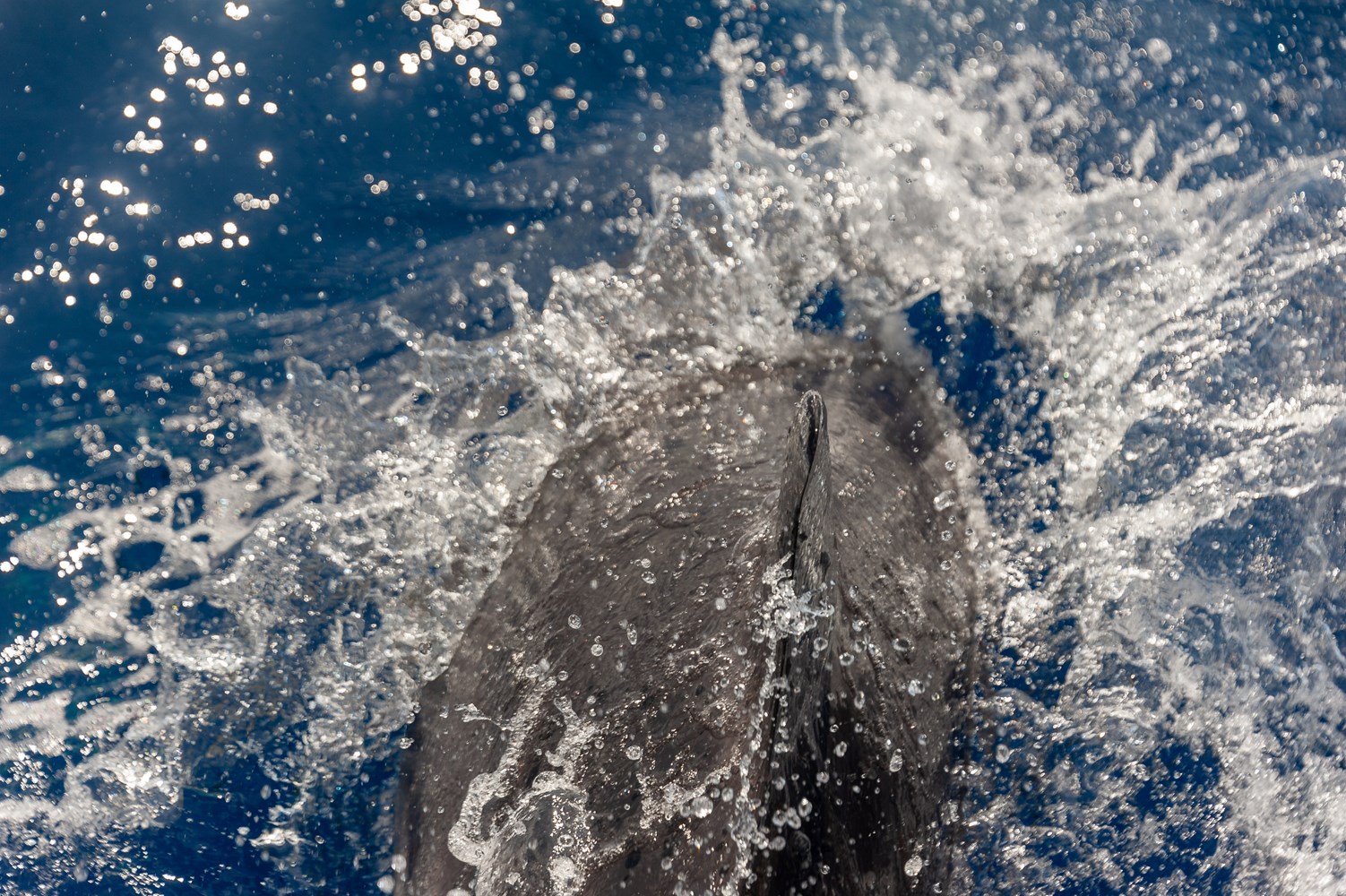
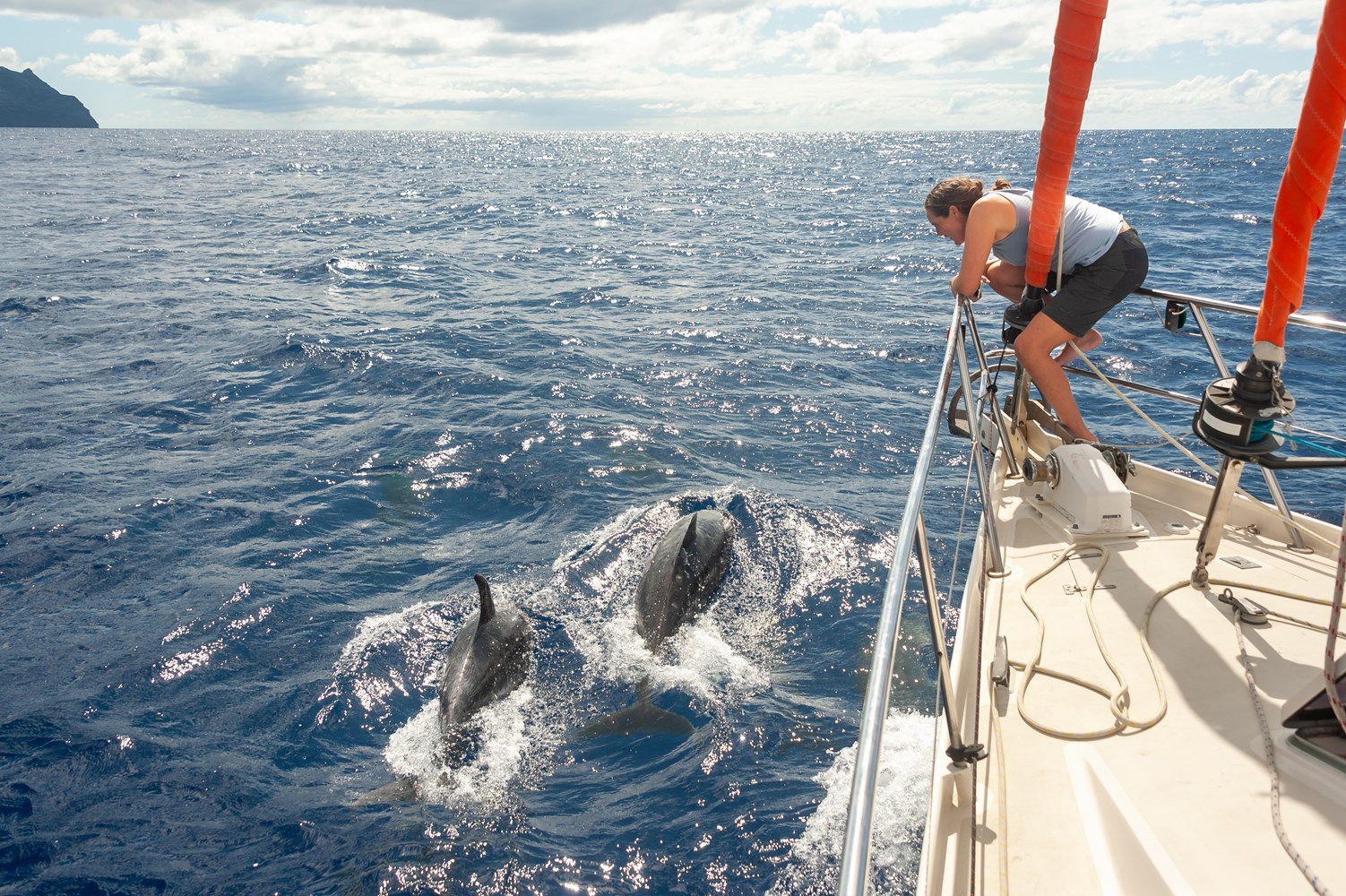
↑ The Saint Helena Welcoming Committee
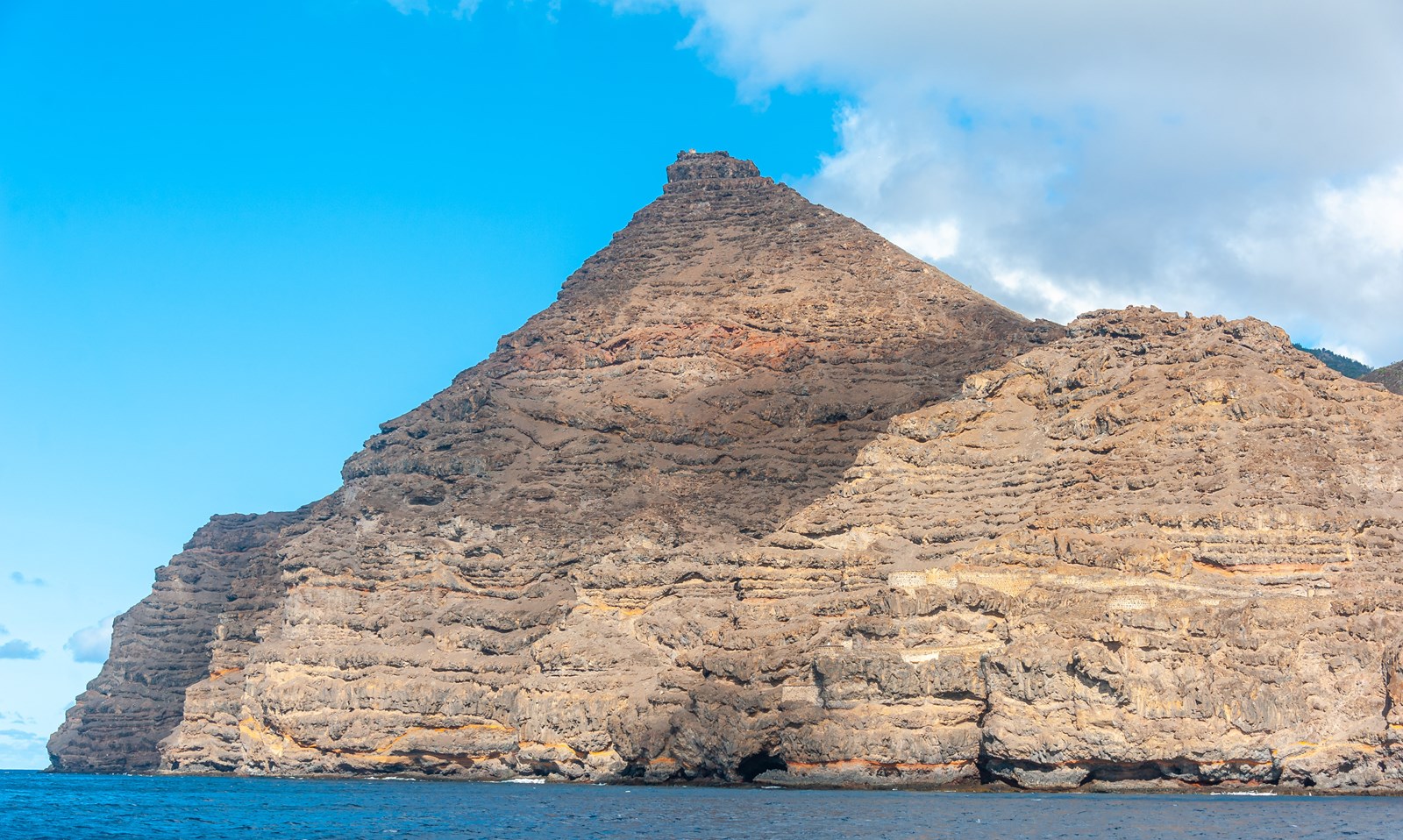
↑ St Helena is a volcanic layer cake, but the forces that shaped it are quiet now.
In most countries the process of clearing in or out in a yacht should be called 'arbritrary bureaucratic mayhem'. The process is anything but 'clear', but not in Saint Helena. The Saints really have made this process 'clear', simple and to-the point.
Every country has slightly different procedures and requirements, most of which are shrouded in mystery. Most countries can't work out what to do with yachts. They try to treat them like ships but that doesn't work because yachties behave more like tourists (or chooks, or anachists, depending on your point of view). Getting them to conform to bureaucratic procedures is like herding cats.
But here in Saint Helena it's more like a welcoming party, complete with mystery envelopes handed out to each guest which we later find contain a swathe of useful information from banking hours for the one and only bank to taxi numbers and guides to the famous Postbox Walks to every point of the island. Steve Kirk, the Harbourmaster, runs a tight ship but he makes it all very easy by arranging everything from Covid tests, to Customs and Immigration. Immigration want to see our medivac insurance. What insurance? No problem, you can buy it at Solomons on Monday, one pound per day, come see us at the Police Station after that. So easy.
There are some 4,500 Saints and they have their own currency tied to the English Pound one-for-one (plus a 5% 'fee') and you won't get anywhere on Saint Helena until you have some of them. There are no ATMs and only a single bank, with a branch office at the dock, probably opened to service the now-non-existent cruise ships and keep them from clogging up the main office used by the locals.
We can't get any Saint Helena Pounds until the bank reopens. It is closed today for end-of-financial-year stocktaking while they count all their one pound notes, or whatever it is banks do at the end of the financial year. No problem, Anne's cafe will open a tab for us. Pay when you can. Saint Helena is that sort of place.
The Grand Tour
Ice Bear, Caroline and Kurt, organized a tour of the island and we joined them in Derek Richard's people mover. Derek is a local and provided great insight into why the airport is so disliked, who the major families are, and whether or not we are likely to be invited to tea at the Governor's (fortunately "no" as I threw out my last tie months ago).
The huge new airport stretching for kilometers across the southern edge of the island, side-on the the prevailing south-easterly trade winds, is universally regarded as a mistake. The first flight in to the newly-opened airstrip was aborted due to wind-sheer, the fuel delivery system (brought in by ship to an island that doesn't really have a port) is a failure, and most locals bemoan the loss of the MV Saint Helena that used to be the only commercial access to the island. Lack of an airstrip meant Saint Helena was isolated and Saints revel in their isolation.
Churches are everywhere on the island. Each community has their own and because there are not enough preachers to go around many churches only have a service once a month or less.
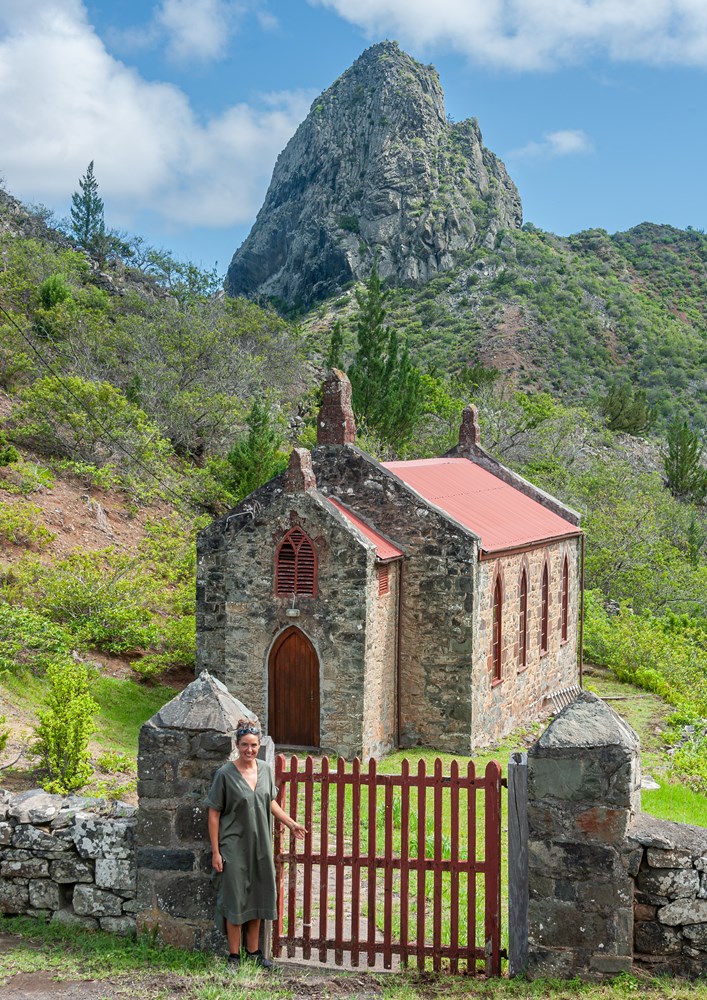
↑ Merel outside her favorite church
Famously, Napoleon Bonaparte was imprisoned on Saint Helena by the British after he lost at Waterloo. A couple of bottles of South African wine daily kept him pretty sozzled but didn't stop him complaining about everything.
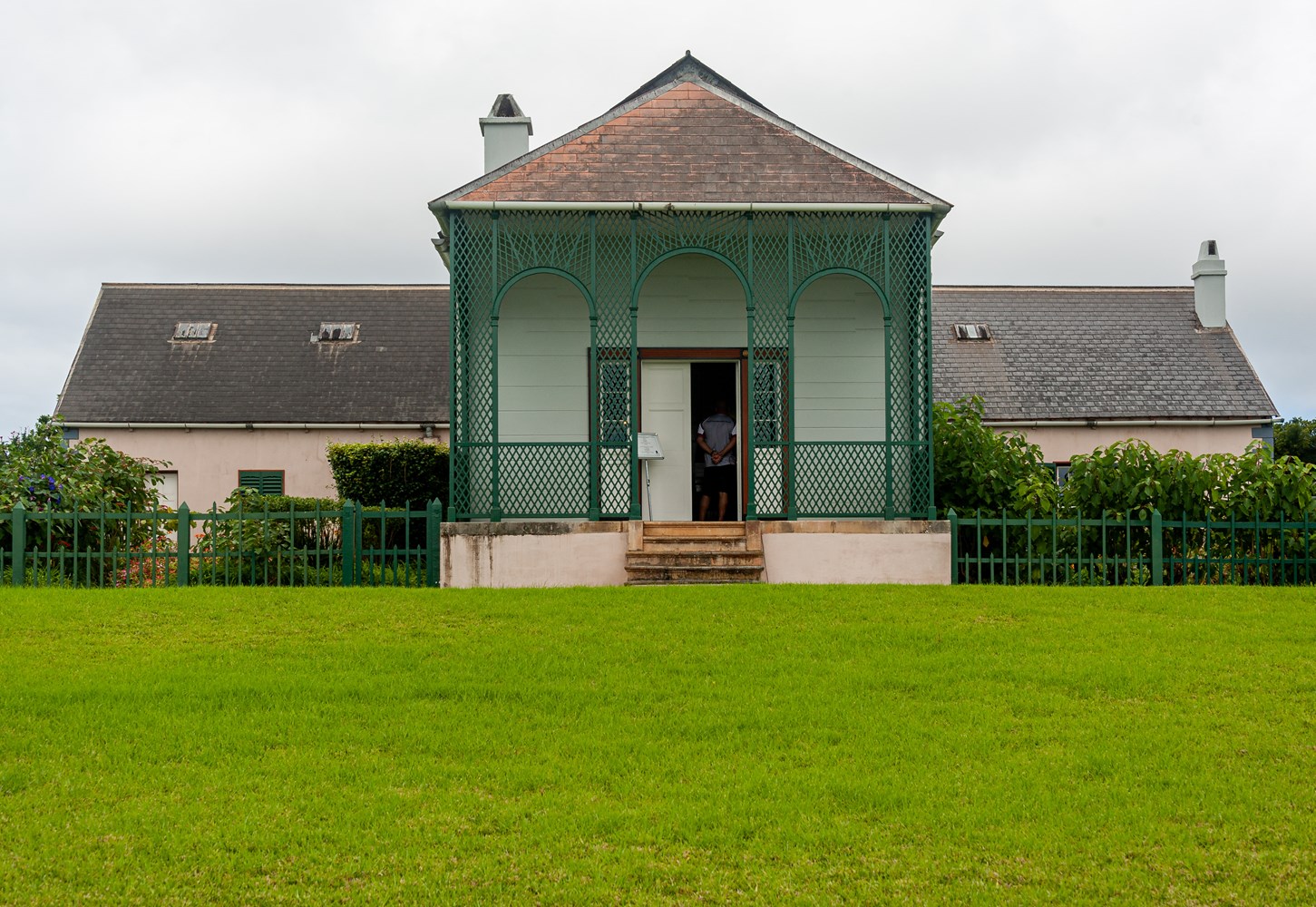
↑ Napoleon's 'prison'
When he died (probably of alcohol poisoning) he chose to be buried in a nice little tomb just down the road, but some years later the French dug him up and moved him back to France.
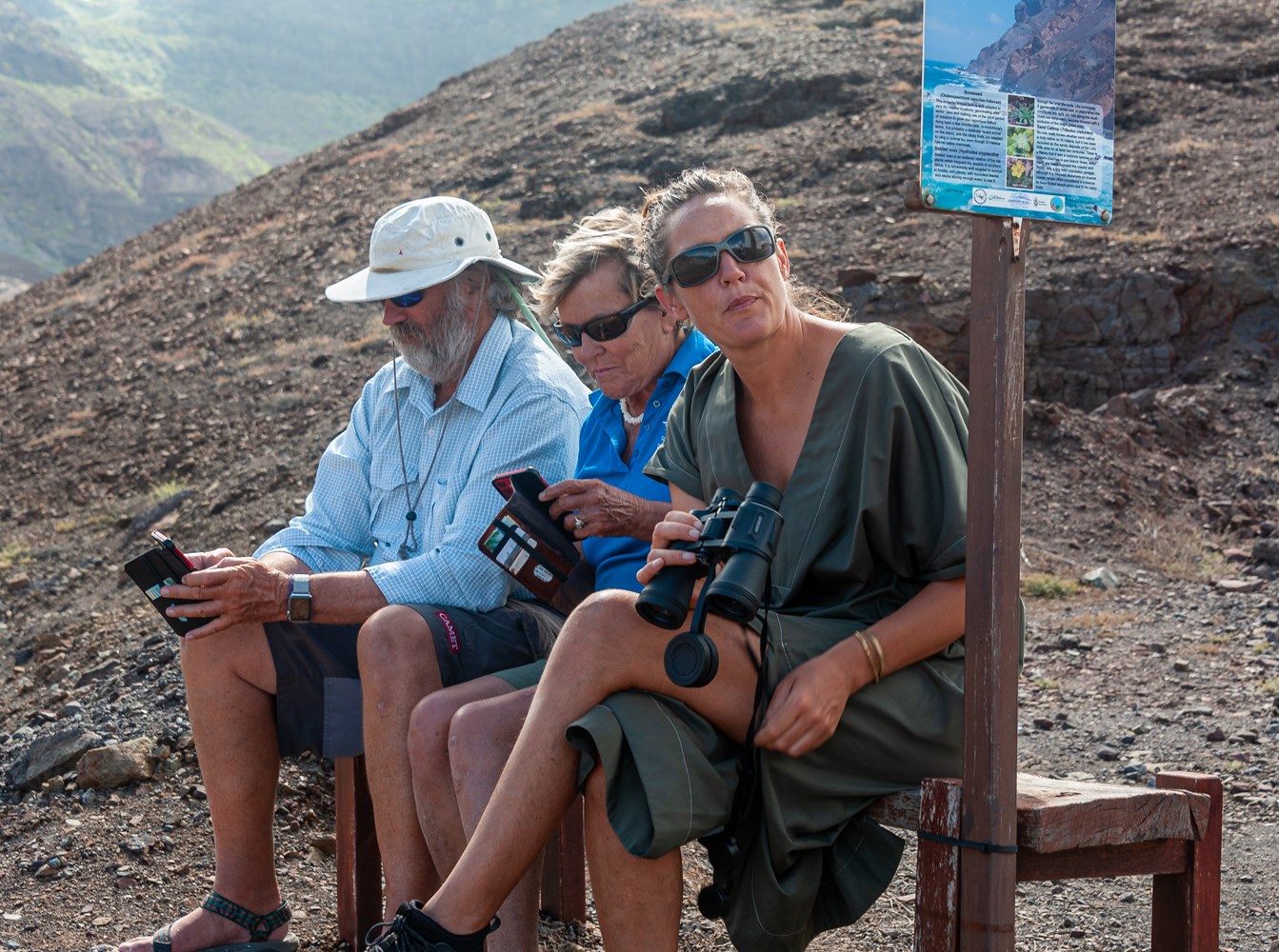
↑ Kurt and Caroline from Ice Bear, with Merel
Another of Saint Helena's attractions is Jonathan, the oldest living land animal in the world, reputed to be 192 years old. He lives at the Governor's place.
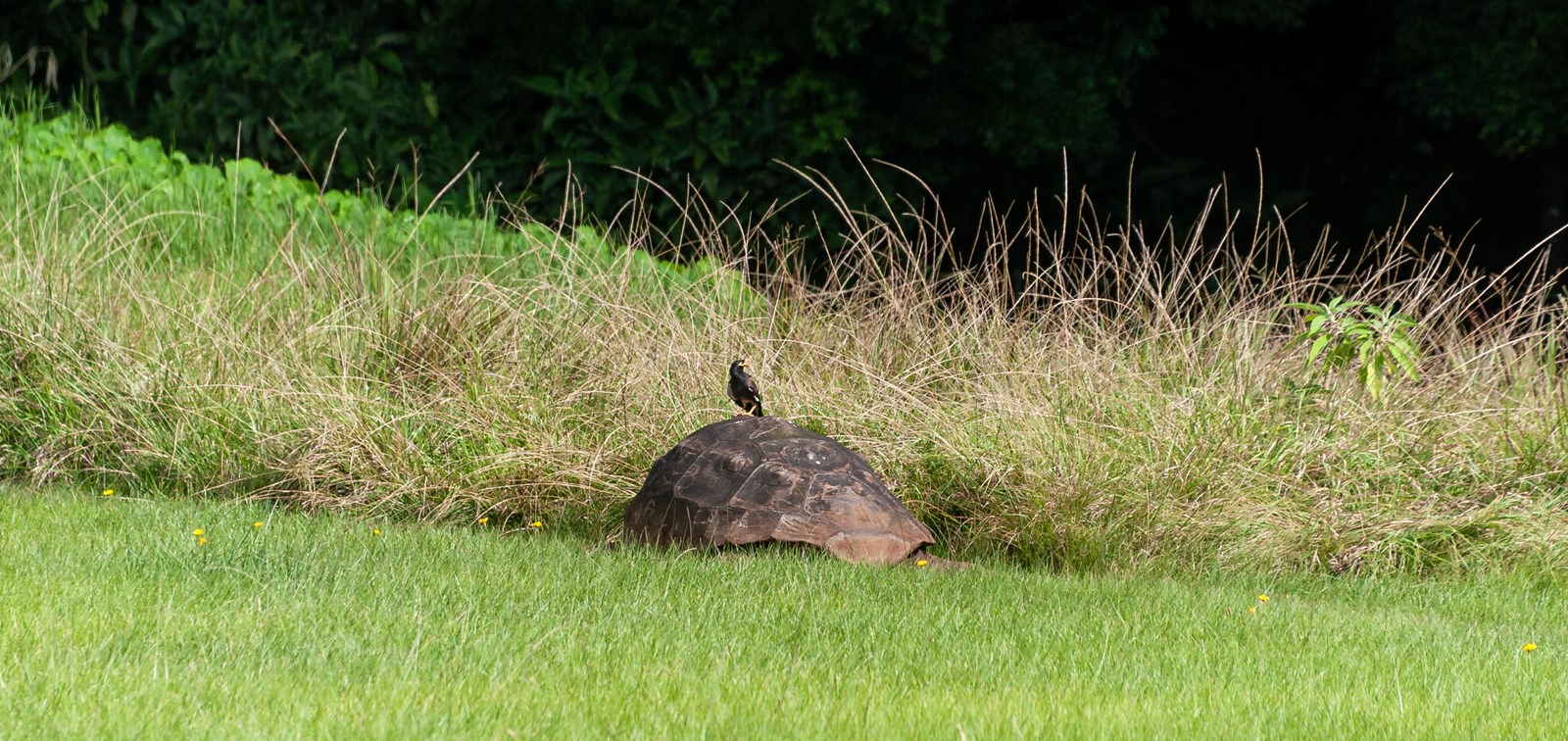
↑ Jonathan lives in styles at the governor's residence ↓
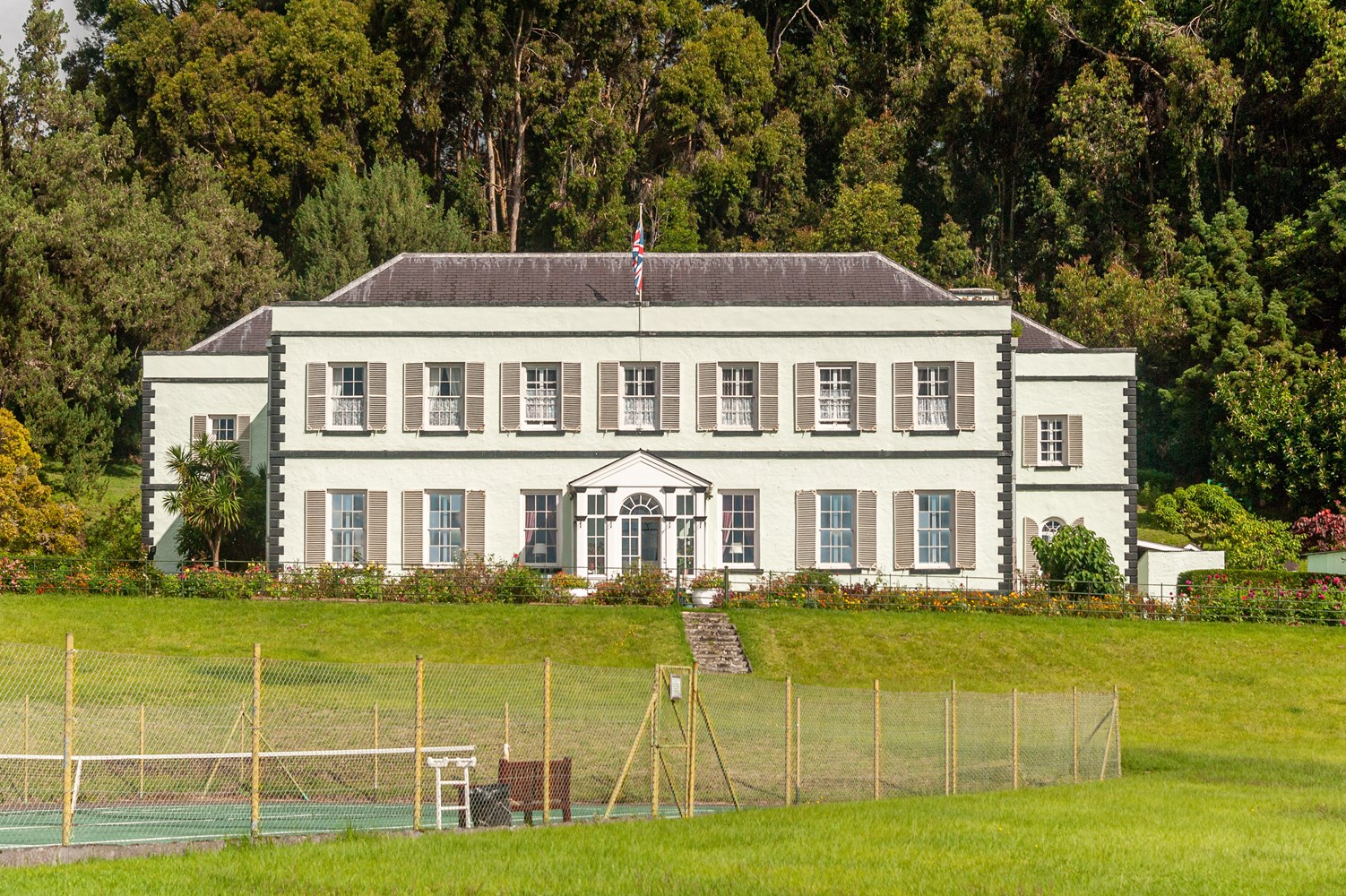
With the day almost over Derek takes us back to his place on the outskirts of town where we meet his lovely wife and daughter, and spend some time in his beautiful garden — much more impressive than the Governor's!
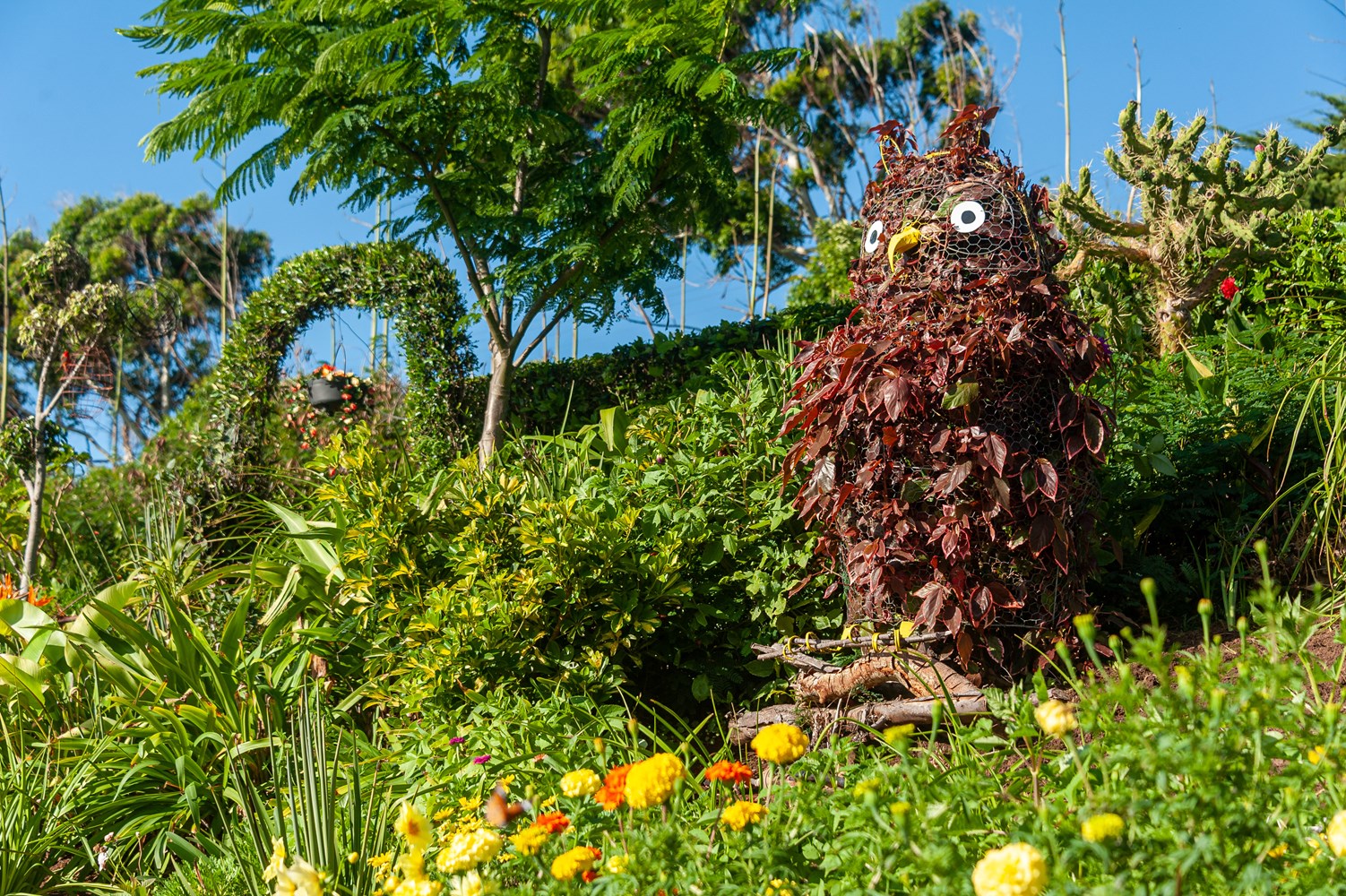
↑ We finish the island tour with a beer in Derek's whimsical garden.
Sharks Bay
On Sundays the local walking club stretch their legs. Matt at the Tourist Office gets the details for us and we join them for a walk to Sharks Bay. Ed, the organizer, gives us a lift to the start of the walk in the back of his ute. Merel and I get in with a GP and the surgeon from the local hospital -- both expats, here for a few months. They are a hospitable group ranging from young, fit and experienced to an older guy who admits to Parkinsons but refuses to quit even after he slips and falls on a narrow path. Ed and I help him back up and suggest he goes back but he is adamant. Eventually he was persuaded to return with someone who had to go back early.
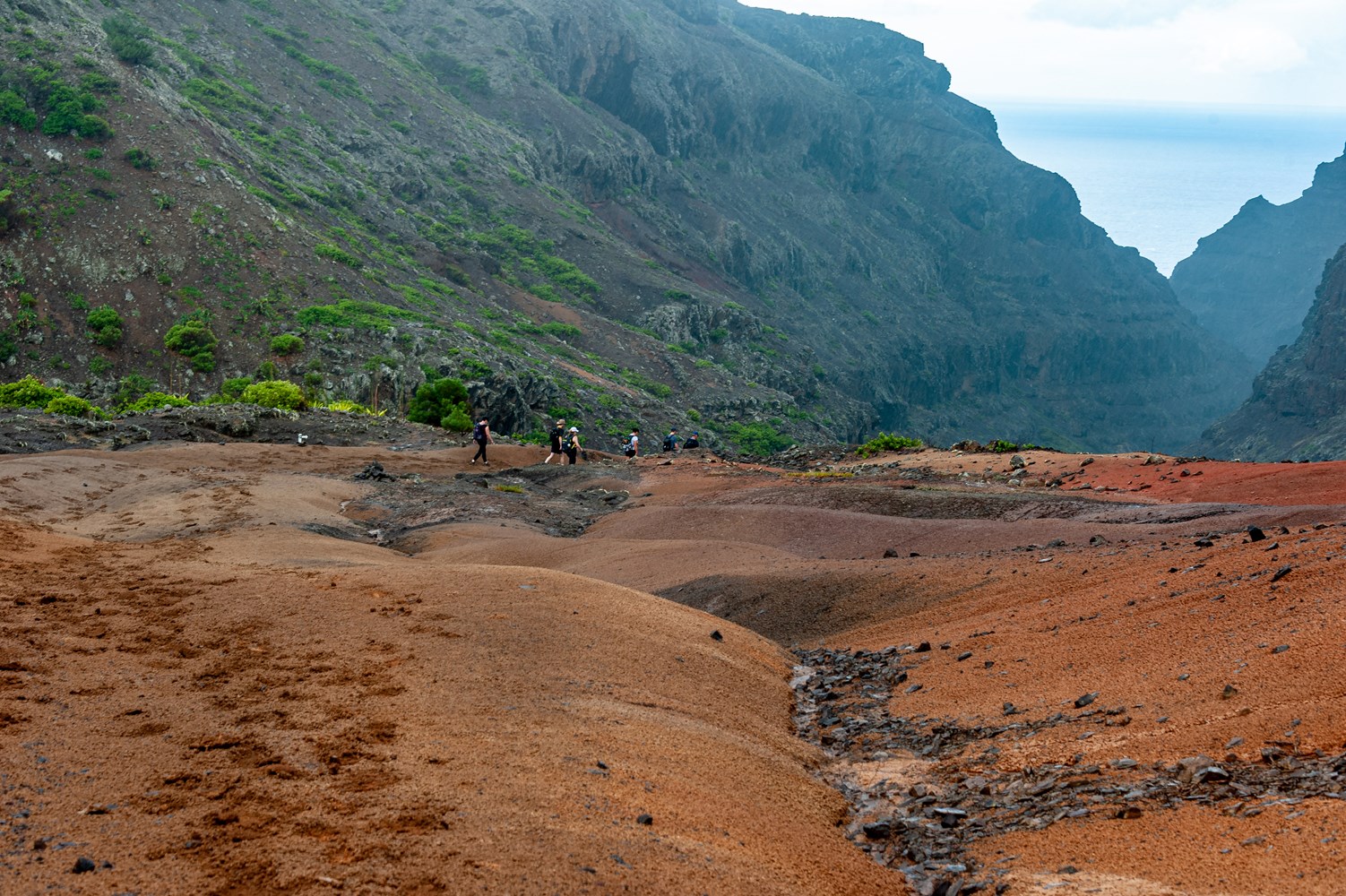
↑ Crossing a field of marl at the entrance to Sharks Valley — slippery mud that sticks like shit and makes your expensive lightweight walking shoes feel like moon boots
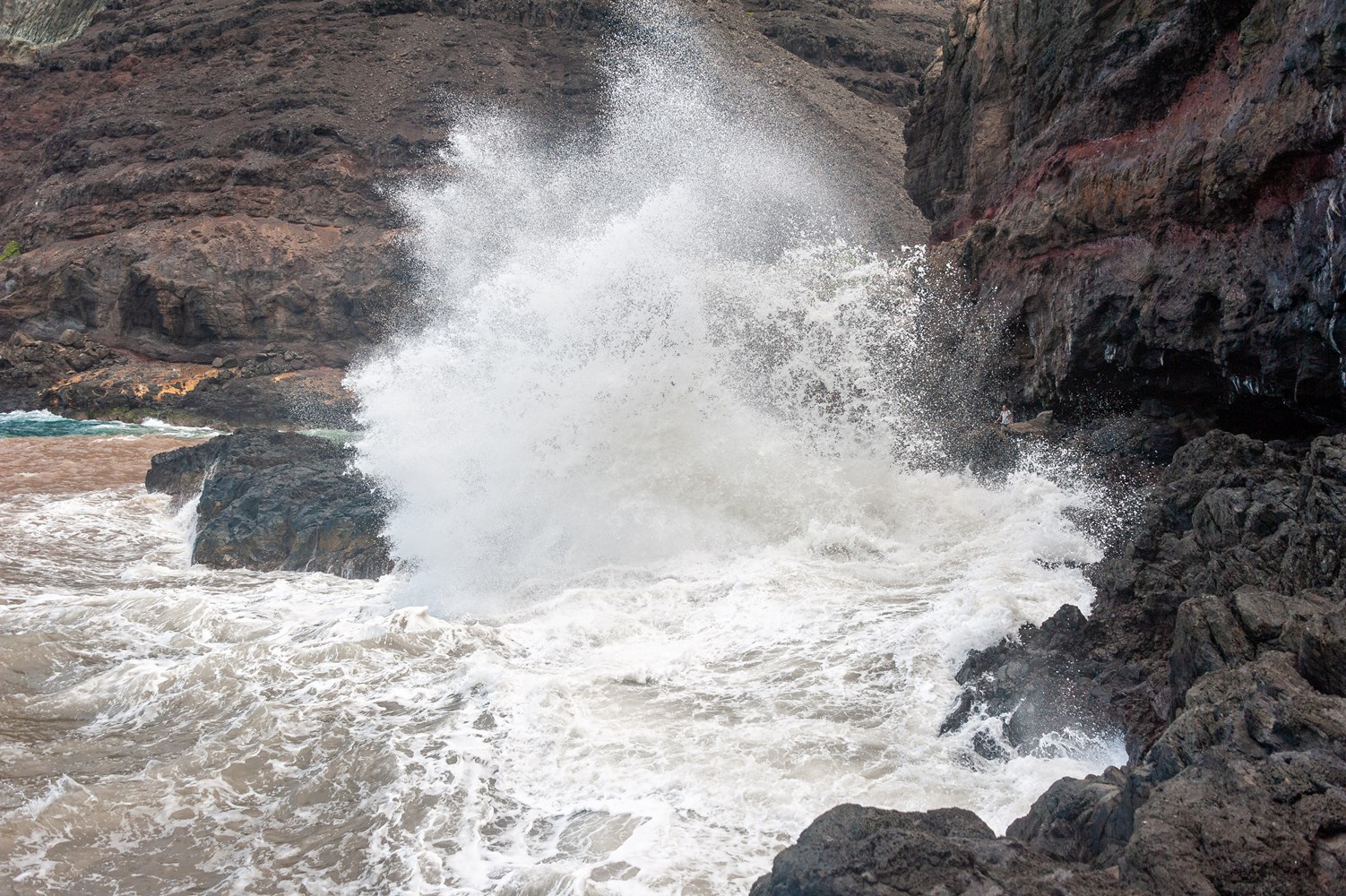
↑ Merel braves the surf. Sharks Valley faces the full force of the Atlantic tradewinds.
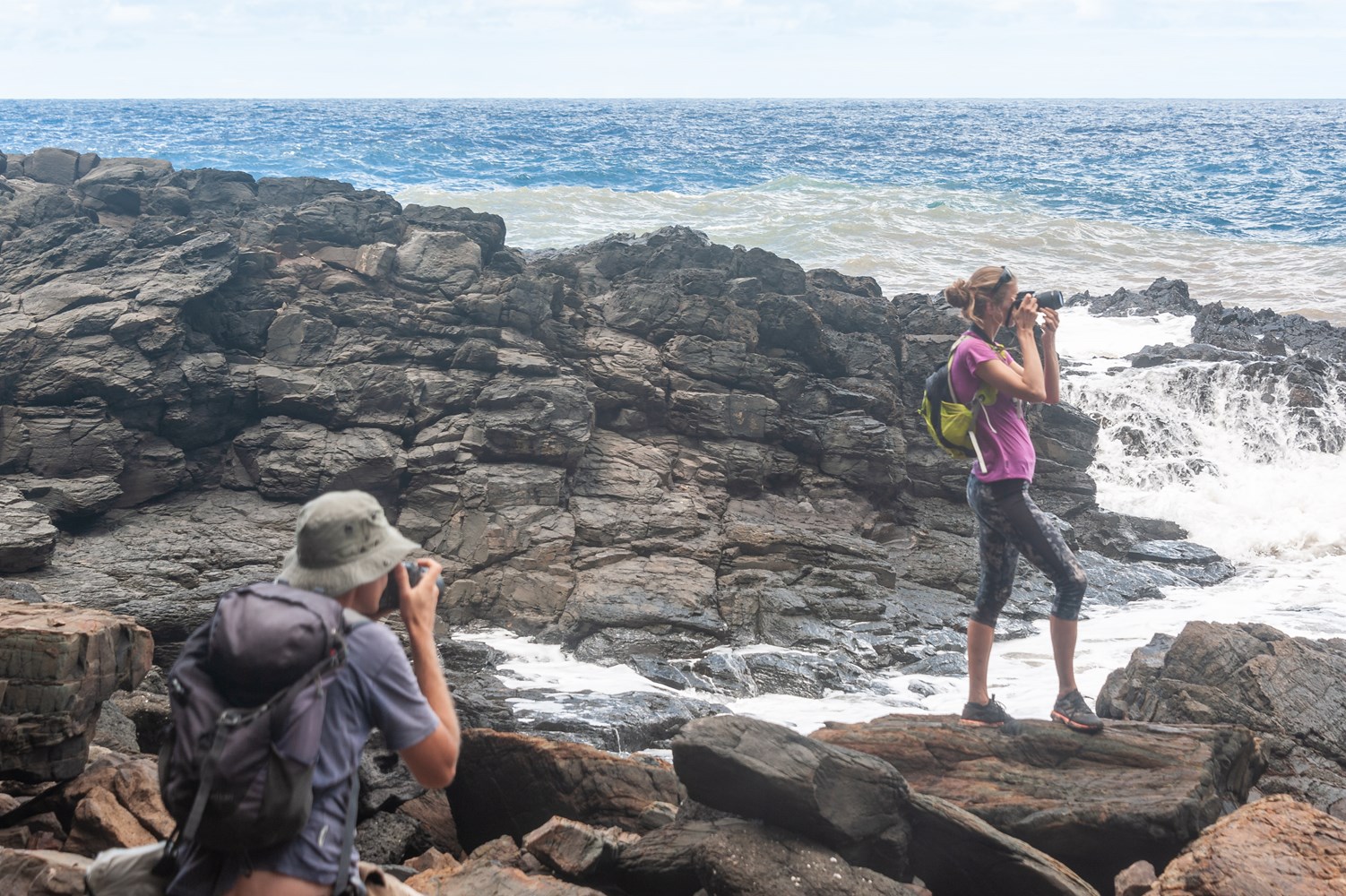
↑ A photo of Ed taking a photo of Manya taking a photo of...
The way back is all uphill. I accompany an overweight but determined woman struggling to keep up. We slow down and chat. She is the defence lawyer for the island. There were four criminal cases in Saint Helena last year. All were defended by her. All were convicted of sex crimes against a minor and were jailed. The defendants were all male and ranged in age from early twenties to their sixties but there seems to be no further pattern to their offences. Prior to this year sex crimes were virtually unknown, which of course does not mean they didn't happen.
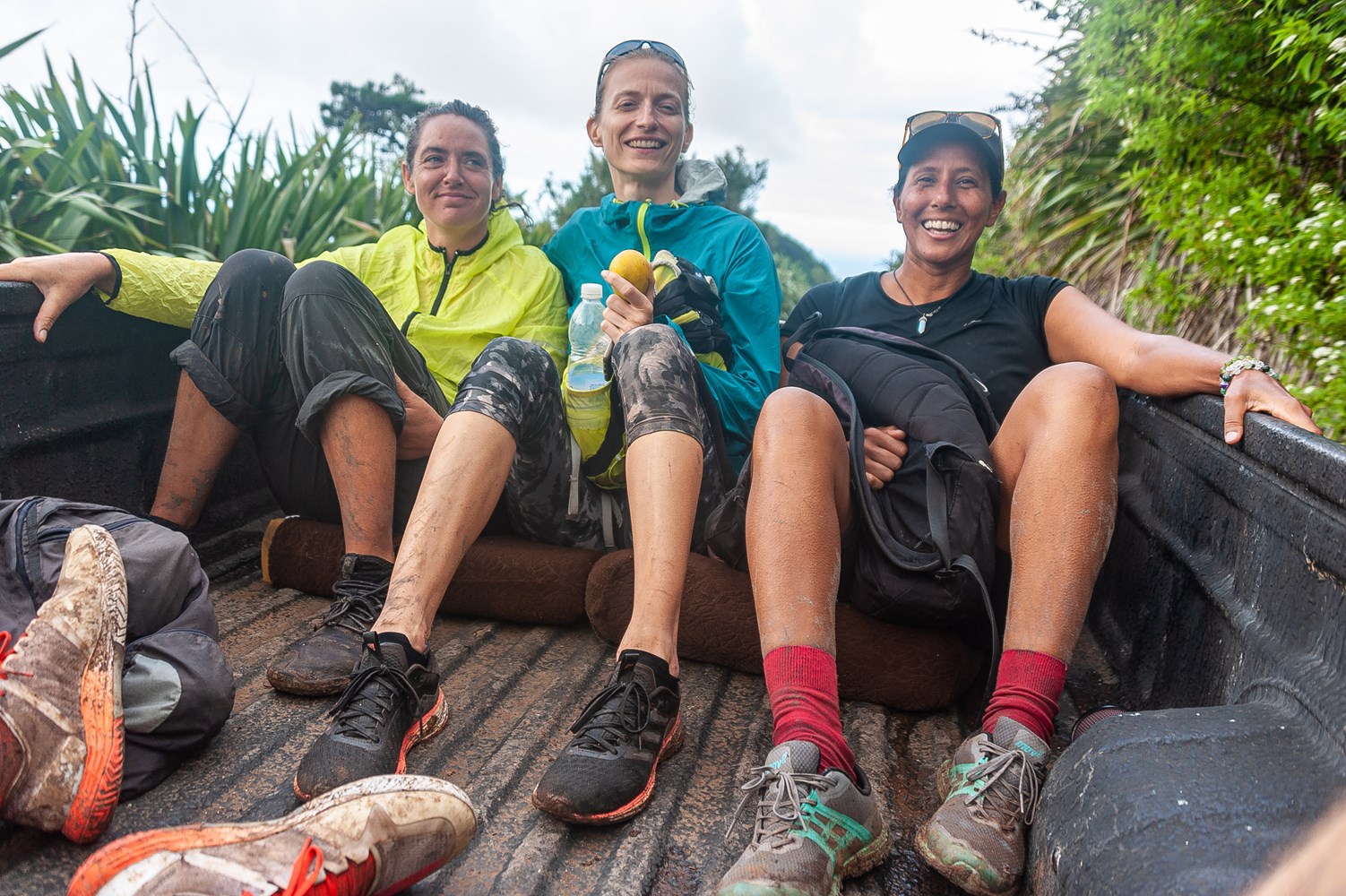
↑ Three dirty women — Merel, Manya and Addy — tired and happy after Sharks Bay.
In a Trance
A few days later we meet up with Iryna, a yachtie who has been in Saint Helena for two years now, since she, her partner and son were stranded by covid. Iryna runs rebirthing sessions. That's a description I have trouble with because of the religious overtones. It has nothing to do with religion. I prefer to call it a rapid breathing trance. Despite not feeling in need of another birth I was eager to try. Iryna is experienced, has a natural aptitude leading the group and has arranged a great venu — the local museum.
The idea is to take shallow and rapid breaths for over an hour while listening to quite loud, intense music.
Iryna dances to the music but she encourages us to simply lie completely still for the entire 70 minutes. Some people, she says, like to set goals, or problems or issues to concentrate on. Feeling high, shaking, tingling and trembling extremities are common. Some people become very emotional and cry or experience an orgasm. We should try to face any fears we might have by continuing the rapid breathing and not back away from it, she says.
I find the breathing difficult to keep up with and have to set a pace quite a bit slower than hers. Within a few minutes, I begin to feel light-headed, and this is followed fairly quickly by a sense of 'now' — being intensely in the present moment, without future or past — and a sense of detachment, as if I am merely an observer of my own life. As I go deeper the day's activities seem to find their way into my awareness and fuse with my emotions. Merel and I had spent the day walking out to Lot's Wife's Ponds and in the trance I become the island landscape that we passed through, the layers of volcanic rock, the intrusions, the broken cliffs and jagged peaks, the coastal surf and the sky and clouds. It is all one and I am part of it. Sure, I have problems and some are insurmountable peaks for me, but there is always a way around or under or over — I just have to find the trail or be bold enough to leave the trail completely and make my own way. As I proceed I am surprised to find steps along the way, ropes to help me up, intricate stonework to stop the path collapsing. None of this is visible from afar but resolves like magic as I proceed.
The sensation is much like lucid dreaming but Iryna's advice was not to control it but to follow where it takes me and go even deeper. But there's a limit to how far I can go. I resist going beyond a certain point. As we come down at the end of the session a calmness and peace descends over us in the museum. We sit around drinking tea for a while discussing our experiences. The others had similar physical sensations with tingling and vibration, but quite different mental sensations. There is no hangover, no downside at all, and the tranquility stays with me thru the following day.
The Consulate
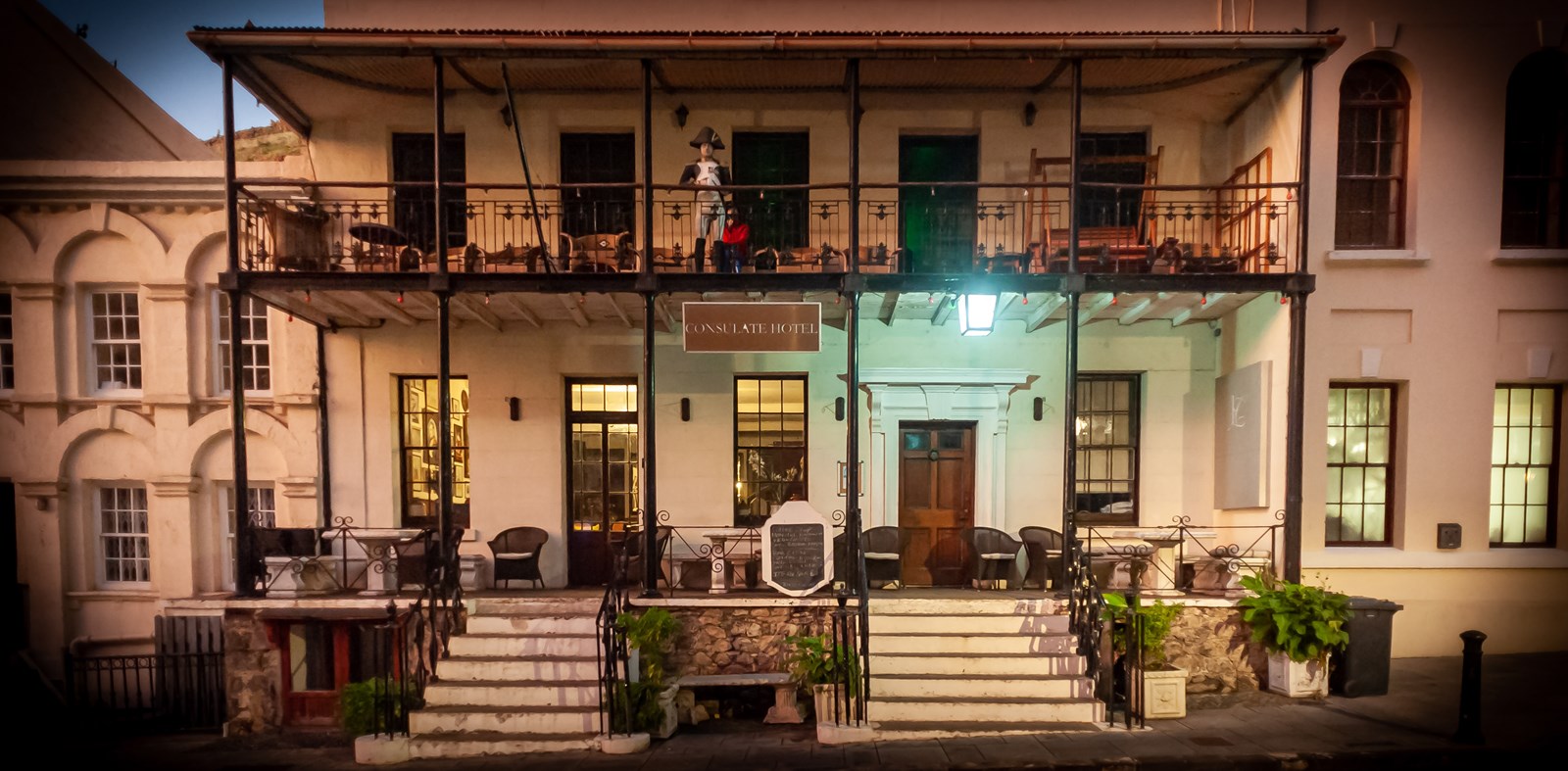
↑ The Consulate Hotel.
It's a hotel, or was. Now it is really just a cafe during the day and a bar in the evening. Hazel, the owner, is a 65 year old collector. Mostly she collects furniture but she's also into carpets, clocks, and trumpets. The guest rooms of the hotel are the repository for her collections. Her friend Peter is a friendly English adventurer, sailor and former academic. He lives out of town on a farm but spends most days at The Consulate behind the counter when Lisa is busy or not available, otherwise just chatting. And there are plenty of people to chat with as The Consulate is a center for a some of the more Anglicised locals.
Merel takes a shine to Hazel and it's mutual so she takes over the kitchen and cooks up batches of scones for the cafe. In return Hazel lets her sleep on the couch; all the guest rooms are full of Hazel's collections. This suits Merel and I well, giving me space on the boat and Merel a change of scenery, and we enjoy our time apart.
We meet a wide variety of locals including Basil George, a poet, and Roy a retired film producer who worked with David Attenborough in Africa.
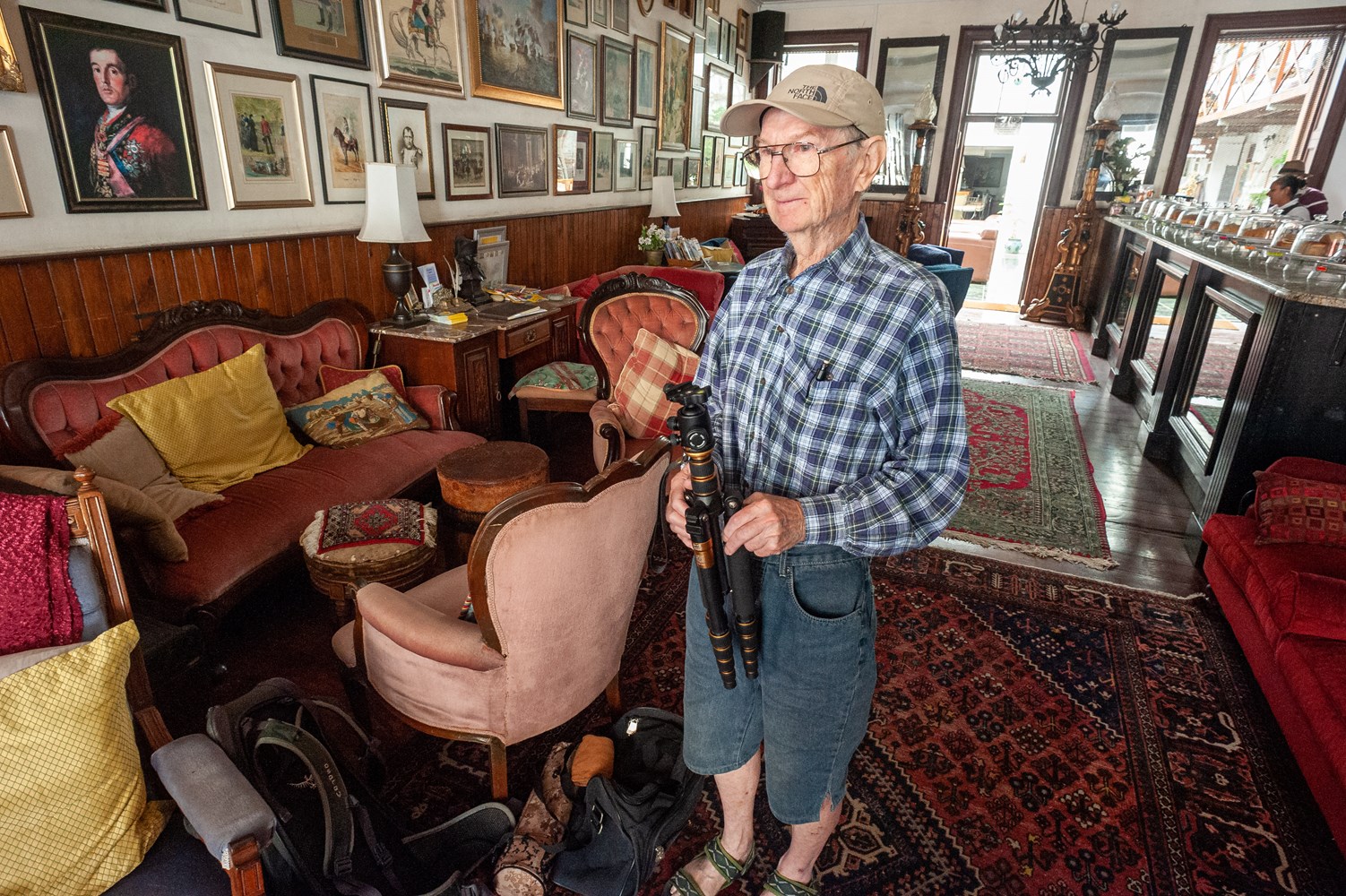
↑ Roy in The Consulate's main saloon.
Hazel tries to entice Merel to come back and manage The Consulate while she returns to Africa for a few weeks. Merel is interested, fascinated by this little island and the people who live here, so maybe she will.
All In
In a sense, Saint Helena is out of this world. Merel says it's Ireland in the '80s; I say Maldon, Australia, in the same era. But where Australians will usually give a stranger space, allow them a separateness and an anonimity, Saints go out of their way to include people by default. The sense of community is incredible. You may think this is a bit claustrophobic but somehow it is not. There is an openness but also a respect for privacy. Yet there is no privacy and there are no secrets between Saints. The contradiction is resolved when you realize that everyone accepts this as the norm — we are all human, with all the faults and graces that adorn us, and we are in this together. Anything is acceptable so long as it doesn't hurt someone else, but if you harm another in some way then there will be consequences. In this life your reward is something important -- the regard of your fellow humans.
The Airstrip
Prior to the opening of the international airport the only access to St Helena was by ship. The MV St Helena made 3-weekly round trips between England and St Helena. It was a combined cargo and passenger ship and unless you had a private yacht that was the only way to get here.
You might think an airport and cruise liners would be a boon for tourism, but it's just the opposite because now people fly in for a day, or stay aboard the cruise ship, venturing forth only to buy their compulsory St Helena hat or I climbed Jacob's Ladder t-shirt before leaving the next day. In the past, when visitors came by the passenger ship that arrived every three weeks and stayed 5 days then they had a choice to stay on the island for either 5 days or 21 days, which was great for local businesses.
Walking down the main street in Jamestown I am greeted by almost everyone I pass, and certainly by everyone who makes eye-contact. If I start up a conversation it will be enthusiastically engaged. But the pace of this island is not geared for day-visitors — what's the point of saying hello to someone who is gone tomorrow? The airstrip will, in time, change Saint Helena's culture and grind it down to the same anonymity as everywhere else.
Saints
Saint Helena is a British Overseas Territory and so of course there is a class system. Here is my classification:
- Yachties
- Travellers like us
- Others, such as Iryna, Andrew and Henry who have been here on their cat Moyo for a couple of years, and Case on his boat.
- Tourists. Very few just now.
- Expats:
- Professionals (administrators, doctors, lawyers, police, etc) here for a few months.
- Retirees such as Hazel and Peter.
- Commercial ruling class:
- Thorpes
- Solomons
- True Saints
Astute readers such as yourself will immediately realize that my taxonomy doesn't match the traditional idea of a class system at all, and of course you have noticed that I left out the Governor. Oh well, we didn't get invited to tea anyway...
The true Saints are the vast majority. These people are of extremely diverse racial origins. One man I spoke to had a DNA test that identified 16 genetic origins including Chinese, Indian, English, Sicilian and several African races. Genetically, the Saints are our future. It seems to me inevitable that over time the humans on this planet will blend into a mix not dissimilar to this.
You may fear that in some future world your descendants will lose your current racial identity, but when you think about it you have not lost the identity of all the tribes and races going back tens of thousands of years that contribute to your current 'race'. Instead, all those identities have been integrated and you would not be you without every single one of them. The whole idea of race is that it's a snapshot of your current human genetic soup, and nothing more. There is nothing permanent or fixed about it.
But then, when popular science and even The Conversation refer to 'race' it seems as if it is some fixed, assigned, god-given thing. The thing is that almost everyone actually means 'cultural identity' or just simply 'culture' when they use the term 'race'. The term has been confused and conflated with culture — concepts of traditional behaviors and social norms, and these have been assumed to be inseparable from genetics. This is not so. To my mind, race is that genetic snapshot of our inheritance — the stuff that we inherit and cannot change: the color of our eyes, hair and skin, our build, our propensity to certain behaviors at the most.
Historically, Saint Helena has endured slavery, indentured labour, military discipline and capital punishment. Labour was brought in from Asia, India, Africa, and Indonesia. These were the people who constructed the town, the plantation houses, the fortifications, the roads and other infrastructure.
Despite lacking a proper port, in the 1700's Saint Helena became an essential stop for sailing ships crossing the South Atlantic. It supplied water, lemons, fish, meat, and flaxen rope. And the local women did a roaring trade with passing sailors, naturally bearing the consequences and thus further diversifying the island's genetic makeup.
Saint Helena is thus a melting pot, an everlasting stew of genetic and cultural diversity. It is an accumulation of human racial diversity and there seems to be no reason why it will not continue.
Leaving
We have been in Saint Helena just three weeks but it is time to go, before Merel buys 'The Consulate'.
We cleared out of Saint Helena yesterday and partied with the Saints till early this morning. Everyone was at the yacht club, including an audience of locals to cheer on the dancers. The band forgot to bring their drum kit(!) but Case played DJ and drove the beat till the early hours. The harbour master was there, many locals, along with a transvestite, an exhibitionist (wanna make a porn movie? I'm your man!), a bunch of oh-so-conservative yachties, a beautiful young doctor whom I and all the much more eligible males of the island have fallen for, and many other faces we have come to know. It was a great party. Thank you Saint Helena.